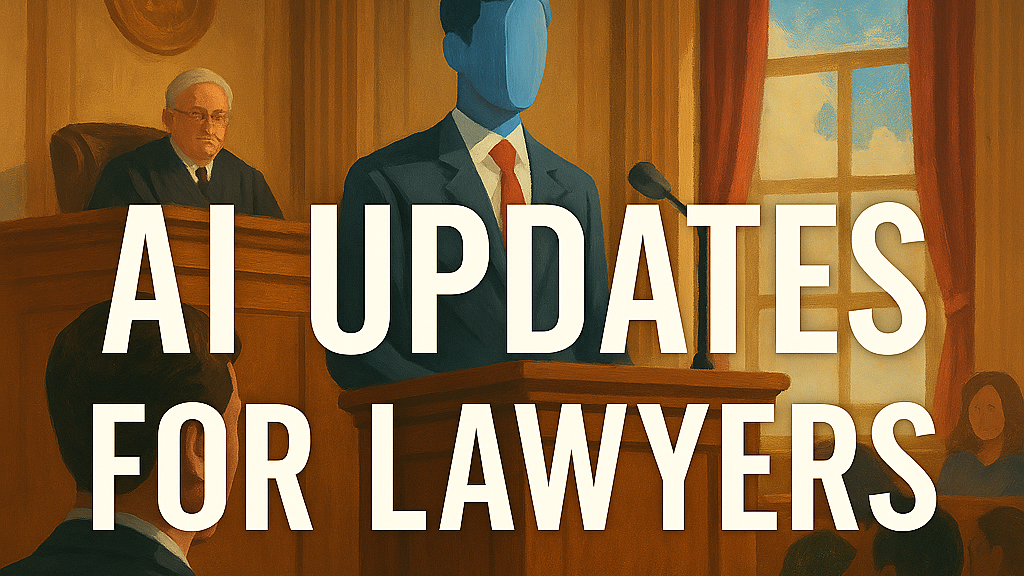The week ending April 4, 2025 saw continued advancements in artificial intelligence relevant to the legal profession, with notable developments in large language model capabilities, legal technology adoption, and ethical considerations. Follow UseJunior on LinkedIn for more updates.
1. AI Avatar Tries to Argue Case in NY Courtroom:
On March 26, 2025, Jerome Dewald appeared remotely before the New York State Supreme Court Appellate Division using an AI-generated avatar to present his arguments. The judges, unaware of the avatar's use, halted the proceedings upon realizing its synthetic nature, emphasizing the need for transparency in courtroom technology.[1]
An artificial intelligence-generated avatar, bottom right, addressing the justices on a video screen set up in the First Judicial Department of the Supreme Court of the state of New York. (Source: AP)
2. AI Adoption Among Small Law Firms Nearly Doubles.
A recent survey revealed that AI adoption has nearly doubled among small law firms and solo practitioners over the past year. The 2025 State of Law Report by Smokeball shows a sharp rise from 27% in 2023 to 53% in 2024.[2] This increasing trend highlights the growing recognition of AI's potential in improving efficiency, particularly in legal research and document management. This data supports our broader analysis showing that law firms are not dinosaurs but are rapidly adapting to AI technologies. Small firms are increasingly embracing AI tools to streamline operations and stay competitive.
3. Google Gemini 2.5 Pro Freely Available.
Google announced the free availability of Gemini 2.5 Pro in the Gemini App.[3] Like prior Google Gemini models, Gemini 2.5 Pro boasts a large context window of up to 1 million tokens (about 800,000 words), allowing for the analysis of entire books and large legal files in a single pass. Early assessments indicate Gemini 2.5 Pro excels at reviewing, summarizing, and analyzing long textual content, potentially streamlining tasks like contract review and case file analysis for legal professionals.
4. LegalWeek 2025 Showcases AI Innovations for Legal Tasks.
LegalWeek 2025 highlighted the increasing integration of AI into various aspects of legal practice. Demonstrations focused on AI-powered document search and analysis tools from vendors like DeepJudge, Vincent AI, Thomson Reuters CoCounsel, LexisNexis Protégé showcased AI-assisted legal tech.[4]
5. AI Research Update: Does AI Just Predict The Most Likely Next Word?
A commonly heard expression in corporate crash courses on AI is that generative AI "just" predicts the most likely next word (or "token", which means syllable or word part). At least since 2019, Ilya Sutskever (the former Chief Scientist of OpenAI) has argued that even apparently simple next-word prediction actually demands a profound understanding of context. Sutskever illustrated this in his 2019 ScaledML Conference talk where he gave the thought experiment of an AI predicting a culprit's name at the end of a mystery novel -- although that task is technically just predicting the next word (i.e., the culprit's name), it is also a task requiring comprehension of the entire narrative.[5] This past week, research from Anthropic put another nail in the coffin of the oft-repeated phrase that AI just predicts the next token. Anthropic researchers probed an AI's internal activity while it was generating a rhyming poem and found that the AI was generating a representation of a rhyming word for the next line when writing the previous line.[6] This suggests that the Claude family of AI can "think ahead" at least by a few words when generating text. We doubt that such behavior is limited to the Claude family of AI. Based on our experience working with reasoning models from Google and OpenAI at UseJunior, it seems likely to us that thinking ahead is a behavior present in other reasoning models also.
For legal professionals interested in leveraging these advanced AI capabilities in their practice, contact our team to learn more about how Junior's AI technology can enhance your document analysis and legal research workflows.
Conflicts of Interest.
The author practiced law for six years at Ropes & Gray LLP prior to co-founding UseJunior. UseJunior is a member of both Google for Startups and Microsoft for Startups and has received grants and in-kind contributions in connection with these programs. The views expressed herein are our own and do not represent the views of Google, Microsoft or Ropes & Gray LLP. This is not legal advice.
References:
[1] Larry Neumeister, An AI Avatar Tried to Argue a Case Before a New York Court. The Judges Weren't Having It, AP News (updated Apr. 4, 2025, at 1:52 PM EDT), https://apnews.com/article/5c97cba3f3757d9ab3c2e5840127f765
[2] AI Adoption Nearly Doubles Among Small Law Firms, According to Smokeballs' 2025 State of Law Report, LawNext (Mar. 2025), https://www.lawnext.com/2025/03/ai-adoption-nearly-doubles-among-small-law-firms-according-to-smokeballs-2025-state-of-law-report.html?utm_source=chatgpt.com
[3] Logan Kilpatrick (@OfficialLoganK), "Gemini 2.5 Pro is now available to all users in the @GeminiApp for free. It's also integrated into canvas mode which makes vibe coding easy..." (Mar. 29, 2025), https://x.com/OfficialLoganK/status/1906149911466275162; see also Google, Gemini model thinking updates: March 2025, Google AI Blog (Mar. 25, 2025), https://blog.google/technology/google-deepmind/gemini-model-thinking-updates-march-2025/
[4] Caroline Hill & Neil Cameron, LegalWeek 2025: Demos and Analysis of DeepJudge, Vincent AI, Thomson Reuters CoCounsel, LexisNexis Protégé and More (Apr. 1, 2025), https://legaltechnology.com/2025/04/01/legalweek-2025-demos-and-analysis-of-deepjudge-vincent-ai-thomson-reuters-cocounsel-lexisnexis-protege-and-more/
[5] Ilya Sutskever, Speech at the ScaledML Conference (Mar. 27–28, 2019), https://scaledml.org (last visited Apr. 4, 2025); see also Ilya Sutskever, Why Next-Token Prediction Could Surpass Human Intelligence, YouTube Interview with Dwarkesh Patel (Mar. 27, 2023), https://www.youtube.com/watch?v=Yf1o0TQzry8.
[6] Tracing the thoughts of a large language model, Anthropic, Mar 27, 2025, https://www.anthropic.com/research/tracing-thoughts-language-model


